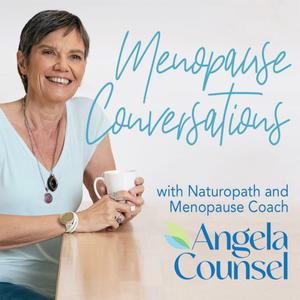
Menopause Conversations
Angela Counsel
Menopause Conversations is a podcast for women in their mid-stage of life. We explore the issues that impact women as they transition through peri and post menopause. Join us and become part of the conversation as we explore the physical, emotional and spiritual aspects of being a women in her mid-stage of life. Episodes include a mix of interviews with Wise Women as well as some solo episodes from Naturopath and Menopause Coach, Angela Counsel.
- 25 minutes 23 secondsClearing the Cholesterol Cloud - The Good the Bad & Why We Need It!
What is Cholesterol? Why is it important and why does it go up in menopause?
In this episode we answer all of these questions and more as we take a closer look at Cholesterol, it's functions in the body and look to remove the fear that is often surrounding it.
We consider diet, your genetics, your bodys production of cholesterol and why, the side effects of cholesterol lowering medications, how to talk to your Dr, LDL vs HDL, and what you can be doing naturally to support a healthy balance.
Want to learn more about how to naturally reduce your cholesterol levels, lose your meno-belly and thrive in menopause?
Join the upcoming FREE 4 Day Secret to Thriving in Menopause without HRT Workshop.
Starting 20th May - register now at http://bit.ly/Menopause_Workshop
23 April 2024, 2:19 am - 21 minutes 25 secondsIs Soy Healthy or Not?
Soy! Is it good for me or is it bad for me?
Join me for this episode as I talk about the benefits and risks of including soy in your diet, especially for women going through menopause.
We'll look at the balances between nutritional science, cultural practices, individual health needs, the quality of the product, and a greater understanding of what Soy actually is and what you need to consider for your own personal health.
Keen to learn more about how to support your health during the peri-menopause and menopause transitions?
Register for my upcoming FREE online 4 Day Secret to Thriving in Menopause Workshop.
Starts 20th May!
16 April 2024, 1:43 am - 18 minutes 58 secondsWhat does Hormone Imbalance mean?
In this weeks episode of Menopause Conversations I cover Hormone Imbalance.
What does it mean? What causes it and what can you do about these imbalances.
Education is empowerment so take an active role in managing your menopause journey by becoming educated on hormone imbalances and the natural methods available to support your health.
As you finish this episode, catch up on previous episode where I go into Using Seeds to Balance Your Hormones.
Find out more by joining my upcoming FREE Menopause Demystified Masterclass.
Register via this link.
9 April 2024, 7:33 am - 19 minutes 42 secondsWhy Do You Promote Against HRT?
In this episode I address the question I am often asked, Why do you promote against HRT?
The short answer is, I don't. I am pro-choice and believe this should be each individuals choice, not my choice or that of a Dr but yours.
It is important to be educated on the risks and benefits when making that choice as some women do need HRT, some simply can not take it, some women try it and it doesn't work for them, others choose not to take it and are looking for an alternative and naturopathic approach. This is where my scope of practice lies.
Join me for the next 20 minutes as I dig deeper into the topic of HRT and in the context of what is actually happening to your body during this stage of life. I'll offer some information for you to consider to make the right choice for you.
If you want to understand more about menopause, I am offering a free Menopause Demystified Masterclass (no sales pitches).
You can register here: https://angelacounsel.com/menopause_webinar
2 April 2024, 10:53 pm - 30 minutes 53 secondsWhy diet's don't work for Meno-Belly.
In this episode we look into why diets don't work for Meno-Belly and why what used to work for you, has stopped working for you as you go through the menopause transition. The good news? I share a solution of what you can be doing to lose that dreaded meno-belly and continue to be fit and healthy as you move beyond menopause. Let's jump in and be sure to grab your FREE ebook resource at the end.
18 March 2024, 10:00 pm - 21 minutes 20 secondsNurturing Your Menopause Well-Being in the Environment
Welcome to Menopause Conversations, in this week’s episode I am delving into the role that your environment plays on your hormones and health.
Let's begin by understanding the role of genes in our menopause experience. Our genetic makeup is what makes us unique individuals. While we all possess specific genes inherited from our parents, it is the environment that determines their activation and expression. Genes act as our body's potential, dictating how it could behave. However, they require external stimulation to be activated or deactivated. For instance, when we exercise, we stimulate specific genes related to muscle strength. Similarly, environmental factors can trigger or suppress certain genes, influencing our health and well-being during menopause.
Moving on to nutrition, we discover a fascinating concept: our digestive system is actually external to our bodies. Visualize it as a big hose running through us, with the inside of the hose being external and the outside being internal. When we consume food, it enters this external environment and interacts with our microbiome, breaking down nutrients and processing toxins. Proper nutrition is crucial for our brain function, hormonal balance, and overall cellular health. Consuming foods that align with our individual needs can trigger positive gene expression and contribute to improved well-being.
Next, let's explore the impact of social interactions and mental well-being. The people we surround ourselves with significantly influence our gene expression. Some individuals thrive when interacting with others, while others prefer solitude or smaller groups. These preferences are driven by our genes and can influence our stress levels. Understanding and honouring our social preferences can help create an environment that supports our unique needs, promoting overall mental well-being during menopause.
Now, let's turn our attention to the physical environment and nature's influence. The place we inhabit plays a crucial role in our gene expression and overall health. Each individual has different preferences for their environment. While some find solace in nature, others thrive in bustling city environments. Nature has been shown to have profound effects on well-being, reducing stress and lowering blood pressure for many individuals. However, it's important to recognize that different people may have diverse responses to various environments. Creating a supportive environment that aligns with our genetic blueprint can enhance our menopause experience and alleviate symptoms.
To wrap up, we invite you to join the "Thriving in Menopause Without HRT" workshop. This comprehensive workshop offers a holistic approach to help you navigate this transformative phase. Over the course of five days, you will gain insights into your genetics, environmental influences, and actionable steps you can take to create a blueprint for optimal well-being. From understanding your nutritional needs to identifying the right exercise frequency and designing a supportive social and physical environment, this workshop empowers you to make informed choices that align with your unique physiology and genetics. Join us and discover how to embrace your menopause journey with grace, resilience, and joy.
Join us on Menopause Conversations and embark on the journey to thriving in menopause. Sign up for the "Thriving in Menopause Without HRT" workshop today, to register visit bit.ly/Menopause_Workshop
19 July 2023, 7:34 am - 22 minutes 55 secondsThe Secret to Thriving in Menopause Without HRT
Welcome back to the Menopause Conversations Podcast! In this episode, we are going on a personal journey, sharing of experiences and discoveries in menopause. Get ready to be inspired and empowered as we delve into a story of transformation and importance of personalised health.
I, a naturopath, kinesiologist, and personalised health coach, has dedicated my career to women's health and gut health. However, when it came to menopause, I found myseld unprepared and unaware of its true impact. Menopause was not given much attention during my naturopathic studies, and my knowledge was limited to common symptoms like hot flushes and mood swings. It wasn't until I experienced perimenopause firsthand that I understood the complexity of this transitional phase.
During perimenopause, I had just given birth to my second child and attributed the physical and emotional changes to the demands of motherhood and a busy clinic. However, as my symptoms persisted and worsened, I began to connect the dots and realised that menopause was the underlying cause. Mood swings, joint pain, body aches, weight gain, and a sense of purposelessness became prominent challenges in my life.
Determined to find a solution, I embarked on a journey of self-discovery and personalised health. I learned about genetic personalised health and the profound impact it can have on overall well-being. By understanding my genetic makeup and listening to my body's needs, I made strategic changes in my diet, exercise routines, and sleep patterns. The results were astounding—I effortlessly shed weight, experienced a reduction in pain, and gained strength and vitality. My stress levels decreased, and I discovered a renewed sense of purpose.
Inspired by my own transformation, I now share my knowledge and strategies with other women. I invite you to join "The Secret to Thriving in Menopause Without HRT" workshop, starting on July 17th. In this workshop, participants will learn how to create their own menopause blueprint based on their genetic profile. I will guide you in making informed decisions about food choices, exercise routines, and lifestyle adjustments tailored to your body's unique needs. This workshop is an opportunity to embrace optimal health and well-being during menopause.
Don't miss out on this life-changing opportunity! Register for "The Secret to Thriving in Menopause Without HRT" workshop today at bit.ly/Menopause_Workshop and take the first step towards a thriving menopause experience.
9 July 2023, 11:00 pm - 18 minutes 49 secondsIntermittent Fasting – Is it Right For Everyone?
In today's episode, we'll be discussing an intriguing topic: intermittent fasting for women in menopause. Menopause brings about various changes in our bodies, and exploring different strategies to support our well-being is essential. So, let's dive into the world of intermittent fasting and its potential benefits and considerations specifically tailored to women in menopause.
Definitions
Intermittent Fasting: Intermittent fasting is an eating pattern that alternates between periods of fasting and periods of eating. It involves cycling between periods of eating and fasting, typically in specific time windows. The fasting periods are longer than the typical overnight fast and can range from several hours to a full day or more. There are various intermittent fasting methods, such as the 16/8 method (16 hours of fasting, 8 hours of eating) or alternate-day fasting, where fasting and non-fasting days alternate.
Restricted Time Eating (also known as Time-Restricted Eating): Restricted time eating is a form of intermittent fasting that focuses on limiting the daily eating window rather than the duration of fasting. It involves condensing all meals and caloric intake within a specific time frame each day. For example, a common approach is the 14/10 method, where you fast for 14 hours and have a 10-hour eating window. This means all meals and snacks are consumed within that 10-hour period, while fasting for the remaining 14 hours.
In summary, intermittent fasting is an overarching concept that encompasses various fasting patterns, while restricted time eating is a specific type of intermittent fasting that focuses on limiting the daily eating window.
Points For Intermittent Fasting for Women in Menopause:
Hormone Regulation: Intermittent fasting can help regulate hormones in women going through menopause. By providing a consistent eating window, it can potentially alleviate hormonal imbalances and reduce symptoms such as hot flashes and mood swings.
Weight Management: Menopause often leads to weight gain due to hormonal changes. Intermittent fasting can be an effective strategy to manage weight during this phase. By limiting the eating window, it can help create a calorie deficit, promote fat loss, and maintain a healthy weight.
Insulin Sensitivity: Intermittent fasting has been shown to improve insulin sensitivity, which is crucial for women in menopause. As hormonal changes can affect insulin regulation, intermittent fasting may help maintain stable blood sugar levels and reduce the risk of developing insulin resistance.
Mental Clarity: Some women in menopause experience cognitive challenges like brain fog and memory issues. Intermittent fasting may promote brain health by increasing the production of brain-derived neurotrophic factor (BDNF), which supports neuron growth and improves cognitive function.
Anti-inflammatory Effects: Menopause is often accompanied by increased inflammation in the body. Intermittent fasting has been linked to reducing inflammation markers, potentially offering relief to women experiencing inflammatory symptoms such as joint pain and stiffness.
If you're curious about whether intermittent fasting is suitable for your genetic profile and body type, I invite you to join me for a transformative workshop called "The Secret to Thriving in Menopause Without HRT." In this workshop, we will delve deeper into the world of genetics, body types, and personalized approaches to menopause management. You'll gain valuable insights and tools to determine whether intermittent fasting aligns with your unique needs. Don't miss out on this empowering opportunity to navigate menopause with confidence. Visit bit.ly/Menopause_Workshop to secure your spot today. Together, let's unlock the secrets to thriving in menopause without HRT.
2 July 2023, 11:00 pm - 27 minutes 6 secondsGut Health & Menopause
This week’s episode of the Menopause Conversations Podcast is all about gut health and the role that your gut bacteria plays in balancing your hormones and supporting your brain health as you move through your menopause transition. We will be covering the following topics:
1 – why having a healthy gut is vital for balancing your hormones
2 – the importance of a healthy gut brain connection when it comes to moods and brain function
3 – some simple steps you can take to improve your gut function
Let’s start with the role of specific gut bacteria required to balance your hormones. These bacteria are know as your Estrobolome. The estrobolome refers to a group of bacteria in the gut microbiome that plays a crucial role in activating and regulating estrogen in the body. It influences estrogen metabolism and balance, which can impact various aspects of our health, particularly during menopause. When the estrobolome is unhealthy or imbalanced, it can contribute to issues such as heavy bleeding, uterine fibroids, breast tenderness, and other menopausal symptoms.
So, what are some factors that influence the estrobolome? Several factors can affect its composition and health. Genetics, diet, alcohol intake, environmental exposures, and medications all play a role. I will share some strategies that can help you have a healthy estrobolome shortly.
Now that you have a better understanding of the role of specific bacteria in balancing your hormones let’s have a chat about the role of other bacteria in reducing symptoms such as foggy headedness, depression, anxiety and reducing your risk of alzheimers and dementia.
The gut and brain are intricately connected through a communication pathway known as the gut-brain axis.
- Nervous system connects brain and gut.
- More serotonin receptors in gut than brain
- Research has shown a direct link between unhealthy gut bacteria and depression
- A healthy gut microbiome plays a vital role in maintaining optimal brain function and regulating mood.
- Imbalances in the gut microbiota can disrupt this connection and contribute to mood swings experienced during menopause.
- the gut microbiome is involved in the production of neurotransmitters, including serotonin and dopamine. These neurotransmitters, often referred to as "feel-good" chemicals, influence our mood and emotions.
- When estrogen levels from the ovaries decline during menopause, serotonin and dopamine levels can also be affected, impacting our emotional well-being. This is where a healthy gut becomes crucial. There are oestrogen receptors in the gut (refer to the estrobolome that I have already spoken about)
If you want to learn more about how you can navigate this time of life with ease join me for the free 5 day Secret to Thriving in Menopause Without HRT workshop starts on July 17th, this workshop will provide you with valuable insights and actionable steps to improve your experience of menopause. Here's what you'll gain over the 5 days:
- Discover the root cause of most symptoms, including the dreaded "meno-belly," which is not solely related to hormones.
- Understand how your genes influence your menopause journey, including whether you'll develop a meno-belly or not.
- Learn about epigenetics and how you can leverage this knowledge to reduce symptoms and say goodbye to your meno-belly.
- Create your personalized Menopause Blueprint, a practical guide with customized steps to help you eliminate your meno-belly and other symptoms.
To secure your spot, simply visit https://bit.ly/Menopause_Workshop. Don't miss this opportunity to empower yourself and thrive in menopause naturally. Join us for the "Secret to Thriving in Menopause Without HRT" workshop starting on July 17th.
26 June 2023, 6:34 am - 29 minutes 6 secondsDebunking HRT Myths
In this episode, we will address some of the misconceptions surrounding Hormone Replacement Therapy (HRT) and offer alternative approaches to navigating the menopause transition.
Let's dive in and explore five key points from this episode:
- HRT is not a cure-all: I've noticed a lot of chatter on social media claiming that HRT is the only way to alleviate menopause symptoms and prevent conditions like osteoporosis, heart disease, and dementia. However, it's crucial to understand that there is no definitive research supporting these claims. While HRT may reduce the risk of osteoporosis, there are other effective strategies for managing bone health that I discussed in a previous episode.
- Non-HRT options exist: Many women I speak with are hesitant to take HRT, either due to personal health concerns or simply a preference for alternative methods. I want you to know that there are numerous options available that can help you effectively manage symptoms, lose weight, and thrive during menopause without relying on HRT.
- Personalised nutrition and exercise: When it comes to eating well, it's essential to understand that there is no one-size-fits-all approach. Each of us has a unique genetic makeup and health history that determines what our bodies truly need. It's about finding the foods that nourish your specific body and support its thriving. Similarly, exercise should be tailored to your body's preferences and requirements. Some women benefit from weight-bearing exercises, while others find strength in activities like yoga or weightlifting.
- Minimising exposure to environmental toxins: Environmental toxins, such as xenoestrogens and obesogens found in plastics, personal care products, and pollution, can disrupt our hormones. By reducing our exposure to these toxins, we can help bring our hormones back into balance. It's about being mindful of the products we use and the environments we inhabit.
- Managing stress as a priority: Stress plays a significant role in hormonal balance during menopause. As our ovaries produce fewer hormones, the burden falls on our adrenal glands, responsible for producing stress hormones. Managing stress levels becomes crucial. Incorporating stress-reduction techniques like meditation, deep breathing, and spending time in nature can support hormone balance and alleviate menopause symptoms.
Remember, these are just some of the key points I covered in this episode. I want you to know that your menopause journey is unique, and it's essential to listen to your body and make informed decisions based on your individual needs and preferences.
18 June 2023, 11:00 pm - 19 minutes 18 secondsThe Importance of Magnesium in Menopause
In this episode of Menopause Conversations, we shine a spotlight on the crucial role of magnesium during the menopause transition. We will discuss the significance of addressing magnesium deficiency and highlights its benefits in restoring hormonal balance.
Here are five key takeaways from the episode:
- Magnesium deficiency is common: Due to depleted soil, most of our food lacks sufficient magnesium. Coupled with high stress levels, women in perimenopause often experience magnesium deficiency. Supplementing with magnesium is essential for optimal health.
- Calming the nervous system and stress response: Magnesium plays a vital role in modulating the HPA axis, our stress response system. By ensuring sufficient magnesium levels, we can effectively manage stress and prevent a prolonged stress response, leading to improved overall well-being.
- Balancing blood sugar levels and insulin: As estrogen levels decrease during menopause, women may become insulin resistant, leading to weight gain and potential health issues. Magnesium helps regulate blood sugar levels, reduces sugar cravings, and supports insulin balance, promoting better metabolic health.
- Enhancing sleep quality: Erratic sleep patterns often accompany the menopause transition. Magnesium supplementation aids in calming the nervous system, promoting relaxation, and improving sleep quality. Taking a magnesium supplement before bed or enjoying an Epsom salt bath can support restful sleep.
- Supporting hormone production: Magnesium plays a critical role in supporting the adrenal glands, which take over hormone production as ovarian function declines. Adequate magnesium levels help maintain optimal progesterone production and contribute to hormonal balance during perimenopause and beyond.
Addressing magnesium deficiency has wide-ranging benefits, including reducing stress, improving sleep, supporting thyroid function, boosting energy levels, and even slowing down the aging process. While blood tests for magnesium deficiency are not accurate, women experiencing stress and hormonal changes can benefit from magnesium supplementation.
Discover the various forms of magnesium supplements available, such as magnesium citrate for constipation relief and magnesium glycinate for easy absorption without bowel issues. Angela recommends a combination product that includes magnesium, taurine, and B vitamins to enhance energy, stabilize blood sugar levels, and support menopause transition and beyond.
Remember, optimizing magnesium levels is a foundational step for women navigating menopause. Tune in to the full episode to gain a deeper understanding of the role of magnesium in promoting overall well-being during this transformative stage of life.
11 June 2023, 11:00 pm - More Episodes? Get the App
Your feedback is valuable to us. Should you encounter any bugs, glitches, lack of functionality or other problems, please email us on [email protected] or join Moon.FM Telegram Group where you can talk directly to the dev team who are happy to answer any queries.
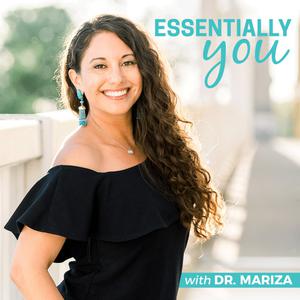 Essentially You: Empowering You On Your Health & Wellness Journey With Safe, Natural & Effective Solutions
Essentially You: Empowering You On Your Health & Wellness Journey With Safe, Natural & Effective Solutions
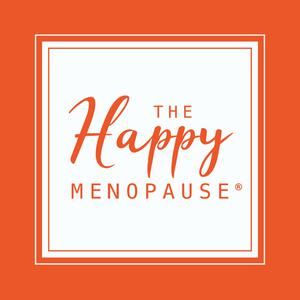 The Happy Menopause
The Happy Menopause
 The Imperfects
The Imperfects
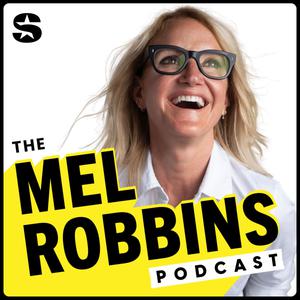 The Mel Robbins Podcast
The Mel Robbins Podcast
 Bounce Forward
Bounce Forward
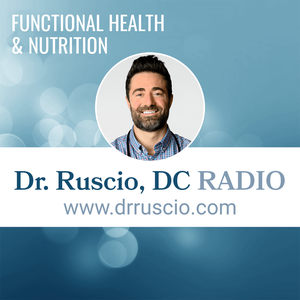 Dr. Ruscio Radio, DC: Health, Nutrition and Functional Healthcare
Dr. Ruscio Radio, DC: Health, Nutrition and Functional Healthcare